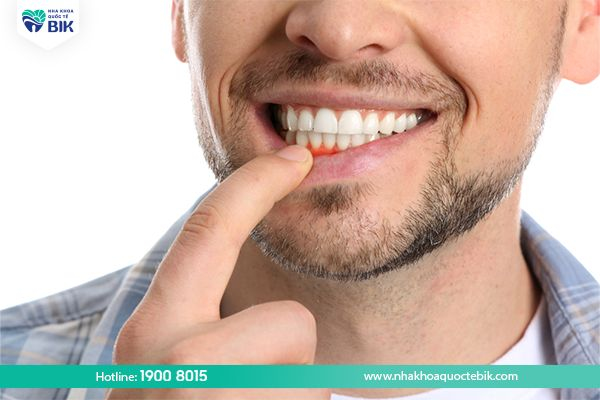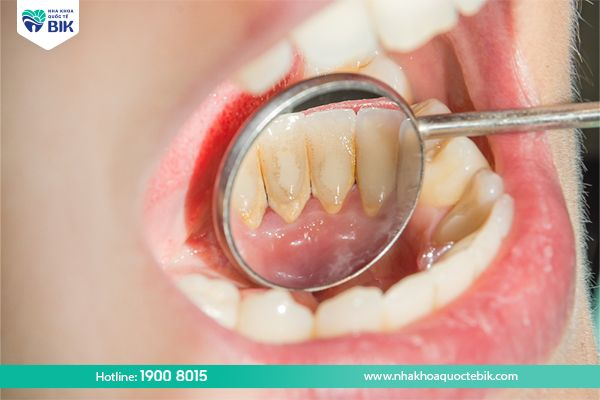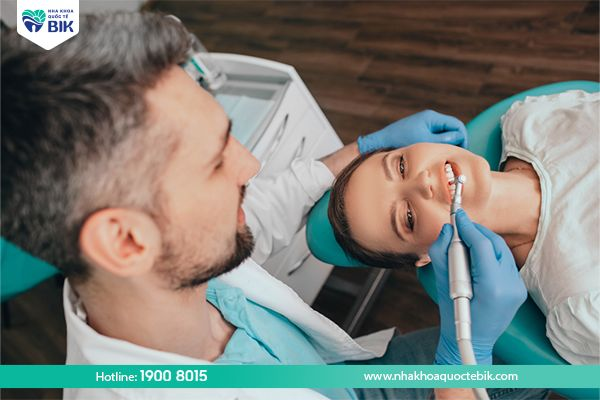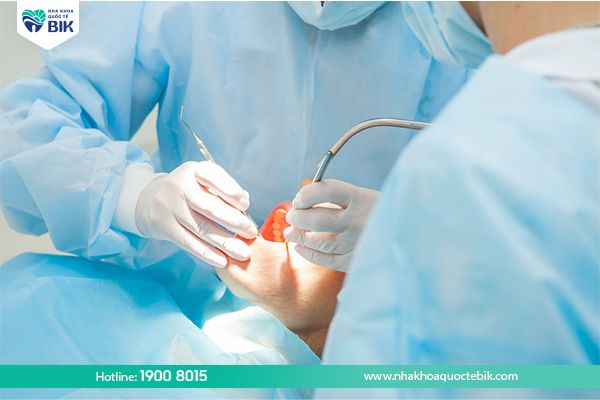Periodontitis is a more severe progression of common gingivitis when not treated promptly. Therefore, severe periodontitisis easy to recognize through signs such as red and swollen gums, frequent bleeding gums, etc. Once periodontitis is detected, you need to see a doctor for a quick examination and treatment to minimize the invasion of real teeth.
1. What is periodontitis?
Periodontitis is a term referring to the tissue around the teeth that plays a role in supporting the teeth, helping the teeth to exist firmly inside the jawbone. This tissue includes the gums, alveolar bone and periodontal ligaments.
Periodontitis is a condition in which the above tissue is inflamed and if left untreated for a long time, it will cause serious effects on oral health as well as overall health. If the periodontium is severely damaged, the risk of tooth loss is very high. At the same time, bacteria from the inflammation can penetrate other organs such as the lungs, heart, bronchi, etc., causing the patient to face health problems related to bones, joints, respiratory system, coronary arteries, etc.

Severe periodontitis is easily recognized by the following signs:
– Gums are swollen, dark red or bright red.
– Gums bleed easily.
– There are gaps or pus pockets between the gums and teeth.
– Teeth become longer or loose because the gums recede.
– Feeling of pain and discomfort when chewing.
– Bad breath.
2. Causes of periodontitis
Periodontitis can be caused by many reasons, but mainly due to plaque around the teeth containing a lot of bacteria. The causes of this condition are:
– Consuming too much food containing a lot of sugar or starch.
– Not having your teeth scaled regularly causes plaque to form thickly, damaging the gums.
– Not brushing your teeth properly causes food plaque to stay in the mouth for a long time and turn into tartar.
– Not actively treating gingivitis creates favorable conditions for bacteria to attack deeper into the tissues around the teeth.

3. Is periodontal disease contagious?
Periodontal disease is divided into two stages: gingivitis and periodontitis. In which, gingivitis is the initial stage and only occurs silently, does not cause the patient to feel too much pain or discomfort, so it is often not noticed.
Gingivitis that is not treated promptly will progress to periodontitis, the symptoms of the disease will be clearer and the patient needs to overcome it as soon as possible to preserve real teeth.
According to experts, periodontitis can be spread through saliva, so the risk of spreading this disease among family members, living together is very high. Therefore, when detecting signs of periodontitis, you should promptly examine and treat it to protect your health as well as avoid affecting the oral health of others.

4. Remedies for periodontitis
To determine whether periodontitis is mild or severe, the doctor will have to examine the oral cavity as well as the depth of the periodontal pocket, and take an X-ray to check for bone loss. From the data obtained, the doctor can give a reasonable treatment method for each case:
4.1. Treating mild periodontitis without surgery
If periodontitis is not too severe, the doctor will only perform minimally invasive treatments such as:
– Scaling to remove bacteria.
– Root planing to smooth the tooth root surface to prevent the accumulation of tartar and bacteria.
– Performing tooth filling combined with cosmetic restoration.
– Having measures to fix loose teeth.
– If the tooth cannot be saved, the doctor will evaluate each individual case and indicate tooth extraction,
– Using antiseptics and anti-inflammatory drugs to control bacteria.

4.2. Surgery to treat severe periodontitis
In cases of severe periodontitis, the doctor may prescribe surgical treatments such as:
– Pocket reduction surgery: The doctor will make a small incision in the gum to expose the tooth root, creating space for more effective scaling and root planing.
– Connective tissue grafting: The doctor will take a small amount of tissue right in the palate or from another location to fill in the missing gum area. This technique helps reduce the coverage of the exposed tooth root and increases aesthetics.
– Bone grafting: In cases where the patient has damaged bone around the tooth, the doctor will prescribe this method. Bone grafting helps prevent tooth loss by creating a foundation, holding the teeth in place.

5. Oral care to prevent periodontitis
– Pay attention to oral hygiene at least twice a day to ensure that plaque on teeth is completely removed.
– Use a soft-bristled toothbrush with moderate brushing force to avoid damaging the gums.
– Use toothpaste containing fluoride to help strengthen teeth.
– Replace toothpicks with dental floss to remove food debris between teeth.
– Maintain a scientific diet, supplement with all the necessary vitamins and minerals to help increase resistance to help the body fight harmful bacteria.
– Visit the dentist regularly at least once every 6 months to ensure that oral health is checked regularly.

So severe periodontitis can be easily recognized through the signs that BIK International Dental Clinic mentioned above. To protect your own health as well as avoid affecting the health of family members, patients should see a doctor for examination and timely treatment as soon as the disease is detected.


















